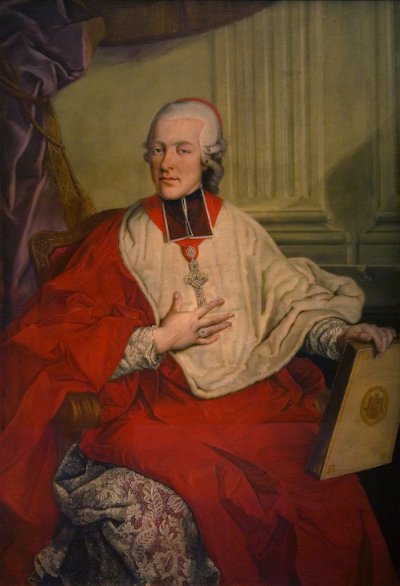Archbishop of Salzburg, 1772-1803. Son of the Reichsvizekanzler Rudolf Joseph Graf von Colloredo-Waldsee und Mels, Colloredo was educated in Vienna and Rome, became a Salzburg canon in 1747, and prince-archbishop of Salzburg on 14 March 1772. His election was controversial: while Austria favoured Colloredo, Bavaria favoured Ferdinand Christoph von Waldburg-Zeil, the popular dean of Salzburg cathedral. Colloredo inherited large debts from his predecessor, which he attempted to reduce; his Enlightenment reforms — based on models from Protestant Germany, Rhineland-Franconia, Italy, the Austrian Netherlands, Swabia, and Bavaria, as well as Austria — ran contrary to Salzburg traditions, in particular the Baroque religious, social and cultural stance of his predecessor, Siegmund Schrattenbach. Colloredo was hampered by a shortage of funds and personal unpopularity; he was considered to be parsimonious and misanthropic. Colloredo fled Salzburg in 1800, in the wake of the political situation in Europe and resigned as head of state in 1803 when Salzburg was secularized.

Johann Greiter, Hieronymus Count Colloredo, c1780 (Salzburg Museum)
- Mozart Relevance
-
Colloredo was Mozart’s employer from 1772 until Wolfgang’s dismissal from court service in 1781 (Mozart had earlier left court service from August 1777, traveling to Mannheim and Paris, but returned as court and cathedral organist in January 1779). Widely seen as Mozart’s Salzburg nemesis, Colloredo nevertheless seems to have treated Leopold and Wolfgang well — or at least as well as his other employees — during the first years of his reign although relations soured thereafter, for unknown reasons. The Mozart family letters, especially those from the period 1777-1779, include numerous negative comments about the archbishop; Colloredo’s side of the story is unknown although it is clear from surviving documents and Mozart’s compositional output during the 1770s that Wolfgang and his father were at least partly to blame for their break with the archbishop.
- Date 1
- 1732-05-31, Vienna
- Date 2
- 1812-05-20, Vienna
- Bibliographic Reference
- SML, 74-77; Eisen 1989